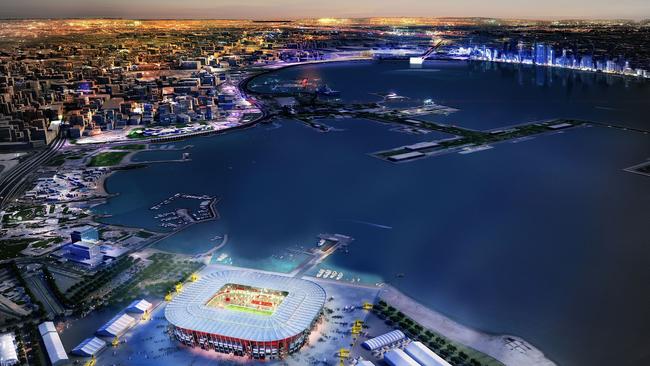Qatar to deliver the driest World Cup on many fronts
For those supporters who go to the 2022 World Cup in Qatar the experience will be very different from Russia.

The World Cup in Russia was a travel adventure inserted into a football tournament, a maelstrom of planes, trains and Yandex (the local version of Uber), with the most distant host cities 2500km away from each other. For those supporters who will go to the 2022 World Cup in Qatar, however, the experience could hardly be more different.
It will be a tournament in which all the matches are played in an area the size of Greater London. The longest journey between the eight stadiums will take less than an hour, and be about the same distance as between Kingston upon Thames and Romford. It could be possible, if one works to a strict timetable and there are no delays, to attend three group matches in one day.
Qatar’s capital, Doha, is a high-rise modern city that for most of the year stands gleaming in the eye-aching glare of the desert sun. For the 2022 World Cup, though, heat will not be an issue — the tournament will be played between November 21 and December 18, so temperatures should be pleasant, in the mid to upper 20Cs.
In fact, supporters may be too cold rather than too hot inside the stadiums. Organisers have promised that all the eight venues will be air-conditioned, and while that may be a must in the 45C heat of the Gulf summer, personal experience has shown that overzealous use during the winter months can leave fans feeling distinctly chilly.
Organisers are expecting a million visitors from overseas during the tournament, which will take place over 28 days instead of the usual 32 in order to minimise the impact of playing the World Cup in the middle of most domestic seasons. That is a substantial number of visitors for such a small country, though not as many as the 1.4 million estimated to have gone to Russia.
But any fan who arrives in Doha with the expectation of finding a Qatari version of Moscow’s Nikolskaya Street, with its array of outdoor bars and cheap beer, is set for a disappointment. Doha is a city where most leisure activity takes place indoors, behind plate glass and with the air-conditioning turned up high. There are some parts of the city, such as the Waqif souq, where there are outdoor restaurants but those are the exception rather than the norm.
Restaurants are unlikely to be serving beer, either. The sale of alcohol is strictly controlled in Doha and only designated outlets, such as some hotels, are permitted to sell it. But it does not come cheap — $18 per pint is not unusual. Supermarkets do sell beer but with one important condition: it is all non-alcoholic.
Although there is an awareness in Qatar that many fans will expect their World Cup experience to involve beer, organisers believe that visitors should make allowances for the culture of the host country. Nasser al-Khater, the deputy secretary-general of the Qatar 2022 supreme committee, says the rules for the sale of alcohol during the World Cup have yet to be finalised, but that it will not be freely available outside designated areas.
“Qatar is a conservative country and we hope the visitors to the country will accept that,” he told The Times. “Qatar is not France or Russia, the fans are not going to be hundreds of miles apart, everyone is going to be concentrated in a 60km diameter.
“If there is freely available alcohol and rivalry, it could get difficult. Part of the World Cup experience is experiencing the country for what it really is. Alcohol is available in Qatar at the moment in designated areas, and it is just to be decided where and how.”
Al Khater pointed out that, during the 1990 World Cup in Italy, the sale of alcohol was banned completely on match days in the 12 host cities, a move that caused the country’s restaurant and bar owners to protest. Instead of beer and banter, organisers hope that supporters will embrace a different kind of experience, including staying in fan villages in the desert in a variety of accommodation, starting at a basic level with tents and going up to luxury pods.
“The desert experience is going to be a big feature of the World Cup, as are fan villages, where people will actually experience living in the desert,” Al Khater said. “We may also have fan zones in these villages as well as unique and different FIFA fan fests, and we also have beautiful beaches.
“This World Cup is going to be futuristic, innovative, and travel times are not going to be more than one hour to any stadium. Being connected technologically is also going to play a big part in this World Cup.
“It is going to be a destination with football as the main attraction but at your fingertips you are going to have a schedule of different types of events that you can attend or participate in. There will also be the cultural events and a wide array of restaurants that you would find at any World Cup.”
Qatar has had a host of issues to deal with, from suspicion and accusations over its original bid for the tournament to the problem of the exploitation of migrant workers, which has been a stain on the development of all the oil-rich Gulf states. More recently, Qatar has found itself under political and commercial attack from its neighbours, Saudi Arabia, Bahrain and the United Arab Emirates.
Russia showed that, if the organisation is perfect, the atmosphere is right and the football is good, then a host nation can deliver a successful tournament in spite of serious political and social controversies. Qatar will have its work cut out to do the same, and until the first match kicks off there in four-and-a-half years’ time, the sense of disbelief among fans that the next World Cup will actually be in the Persian Gulf is sure to continue.
The Times



To join the conversation, please log in. Don't have an account? Register
Join the conversation, you are commenting as Logout